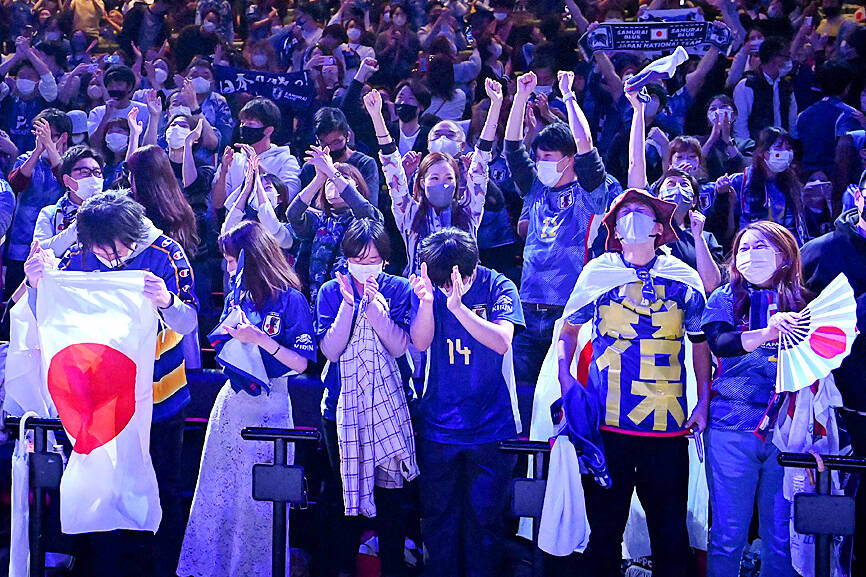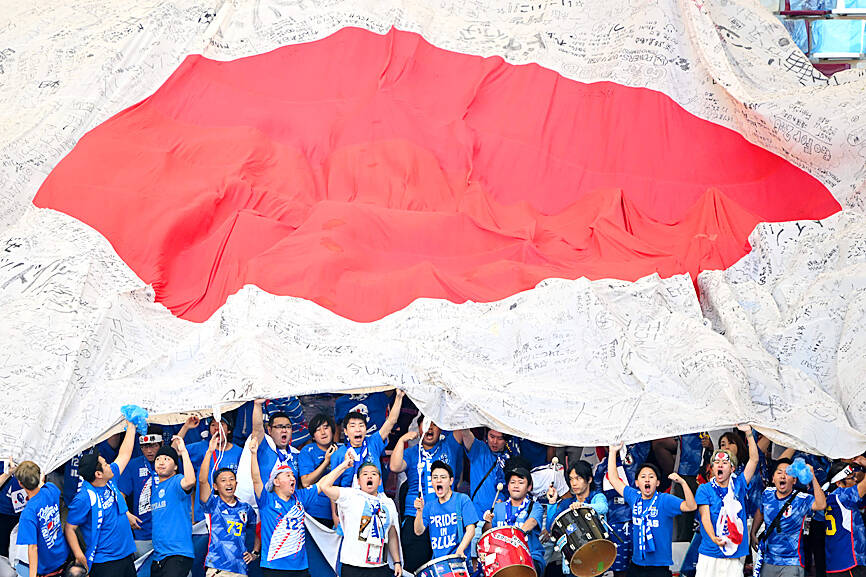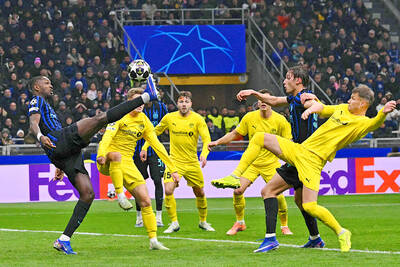The sight of Japanese fans at a World Cup bagging trash after a match — win or lose — always surprises non-Japanese. Japanese players are famous for doing the same in their team dressing room: hanging up towels, cleaning the floor and even leaving a thank-you note.
The behavior is driving social media posts at the World Cup in Qatar, but it is nothing unusual for Japanese fans or players. They are simply doing what most people in Japan do — at home, at school, at work or on streets from Tokyo to Osaka, Shizuoka to Sapporo.
“For Japanese people, this is just the normal thing to do,” Japan coach Hajime Moriyasu said. “When you leave, you have to leave a place cleaner than it was before. That’s the education we have been taught. That’s the basic culture we have. For us, it’s nothing special.”

Photo: AFP
A spokeswoman for the Japan Football Association said it is supplying 8,000 trash bags to help fans pick up after matches with “thank you” messages on the outside written in Arabic, Japanese and English.
Barbara Holthus, a sociologist who has spent the past decade in Japan, said that cleaning up after oneself is ingrained in Japanese culture.
“You’re always supposed to take your trash home in Japan, because there are no trash cans on the street,” said Holthus, the deputy director of the German Institute for Japanese Studies. “You clean your classroom. From a very young age you learn you are responsible for the cleanliness of your own space.”

Photo: AFP
Many Japanese elementary schools do not have janitors, so some of the cleanup work is left to the young students. Office workers often dedicate an hour to spruce up their areas.
“It’s partly cultural, but also the education structures have been training you for a long time to do that,” Holthus added.
This is Japan’s seventh straight World Cup, and their cleanliness began making news at their first World Cup in 1998 in France.
Prior to the 2020 Olympics, Tokyo Governor Yuriko Koike cautioned that visiting fans would have to learn to clean up after themselves.
However, the problem never materialized after fans from abroad were banned from attending the Games because of the COVID-19 pandemic.
Tokyo has few public trash receptacles. This keeps the streets cleaner, saves municipalities the costs of emptying trash cans and keeps away vermin.
Midori Mayama, a Japanese reporter in Qatar for the World Cup, said that fans collecting trash was a nonstory back home.
“Nobody in Japan would report on this,” she said, noting the same cleanup happens at Japanese professional baseball games. “All of this is so normal.”
It might be normal to Japanese, but Alberto Zaccheroni, an Italian who coached Japan from 2010 to 2014, said it is not how most teams act when they travel.
“Everywhere in the world players take their kit [uniform] off and leave it on the floor in the changing room. Then the cleaning staff come and collect it,” he said. “Not the Japanese players. They put all the shorts on top of the other, all the pairs of socks and all the jerseys.”

Fenerbahce on Thursday earned a rare 2-1 win in England, but were still knocked out of the UEFA Europa League by Nottingham Forest in the playoffs. Forest entered the second leg with a healthy 3-0 lead from the opener in Istanbul — where Vitor Pereira made an impact in his first game in charge — and that proved enough to advance to the round-of-16 with a 4-2 aggregate score. The result was a boost for Forest, struggling at 17th place in the Premier League, in their return to Europe after three decades. They next face Real Betis Balompie or Kerem Akturkoglu gave Fenerbahce

The Cleveland Cavaliers on Tuesday emphatically got back to winning ways in the NBA, coasting to a 109-94 victory over the New York Knicks as their recent star signing, James Harden, scored 20 points. The Cavs took the lead barely a minute into the game with an Evan Mobley three-pointer and never gave it up in a thoroughly comfortable night for the red-hot Ohio franchise. Former NBA Most Valuable Player (MVP) Harden, who was brought in from the Los Angeles Clippers this month, has never won a championship, despite being one of the most decorated players in the league. That was a key

LATE RALLY FAiLS: Jalen Duren led a late Detroit Pistons fightback, but it ultimately fizzled as a resolute San Antonio Spurs saw out the game Victor Wembanyama on Monday led a defensive masterclass as the San Antonio Spurs outmuscled the Detroit Pistons 114-103 in an intense and aggressive clash between the NBA’s two most in-form teams. Sitting second in the Western Conference, the Spurs were pushed hard for their ninth straight victory by the East-topping Pistons, who had entered the home court matchup on a five-game winning streak of their own. Defenses dominated the first meeting between the two sides this season, with Wembanyama making six blocks and 17 rebounds to fuel transitions as the Spurs pulled clear in the latter stages. While the Pistons’ shooting was at

HAT-TRICK: In the other games, Newcastle United and Leverkusen also advanced, as did Atletico Madrid, with Alexander Sorloth scoring three goals What a difference a year makes. Or nine months to be precise. Last season, Inter reached the UEFA Champions League final in style, with thrilling victories over Bayern Munich and Barcelona, but on Tuesday, the Italian giants limped out of the competition with a disappointing 2-1 loss at home to Bodo/Glimt — knocked out in the playoff round 5-2 on aggregate — in what is being labeled as one of the biggest upsets in Champions League history. It was not the first major upset the tiny Norwegian team have pulled off this season after wins over Manchester City and Atletico Madrid, and